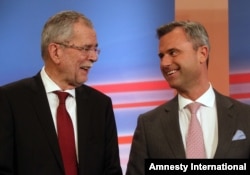Polls showing a clear victory for Austria's anti-immigrant Freedom Party after a first round of elections Sunday could mean Europe's migrant issue is driving voters across the continent to support less liberal politicians, according to analysts.
The pattern became evident in eastern Europe last year, when images of tens of thousands of migrants transiting through Hungary helped right-wing Prime Minister Viktor Orban consolidate his support. In October, promises of a more assertive approach to the European Union and its calls for each member state to absorb thousands of migrants helped catapult the nationalist Law and Justice Party’s Beata Szydlo to victory in Poland.
In western Europe, analysts saw the prospects of a right-wing accession to power as more unlikely since, until now, most had been third-party forces that challenged but failed to supplant establishment parties.
Analysts see developments in Austria as a warning sign.
Results showed the Freedom Party’s Norbert Hofer taking a clear lead, leaving the two mainstream parties, that have dominated for years, with insufficient votes to run in a runoff election next month. Hofer will face off with an independent candidate, Alexander Van der Bellen, formerly with the Austrian Green Party and seen as pro-migrant.
The election results in Austria could be a first indication of what analysts like Dana Allin recently described as a swing away from the international liberal order in Europe.
“I’m not sure how far the swing is going to go but there are worrying signs,” said Allin, a foreign policy expert at the International Institute for Strategic Studies, a London research institution. “I don’t know if I believe that we’re moving in the direction of illiberalism, but the liberal order is fragile,” he said.
The campaigning in Austria has been dominated by economic issues like taxes and pension reform, but the influx of tens of thousands of migrants last year has been a big factor for voters who see the establishment parties as not handling the migrant crisis effectively.
When trains loaded with Syrian refugees pulled into Vienna’s main train station last year, scores of Austrians welcomed them with coffee, snacks and applause.
Sentiments gradually changed, as people saw the numbers swell and negative reports about how some of the migrants behaved.
“People have seen the absolute numbers that have exceeded initial expectations,” Alan Mendoza, head of the Henry Jackson Society, a London research organization, told VOA. “People’s goodwill has evaporated,” he said.
Those sentiments were fueled by scenes of men, including some migrants, groping women during New Year’s Eve festivities in neighboring Germany. In Vienna, police chief Gerhard Pursti caused outrage among Austrian women’s advocates when he warned, “Women should in general not go out on the streets at night alone” to protect themselves from sexual assault.
Critics accused authorities of failing to protect citizens.
Now, at the polls, “people have had to turn to extreme solutions to vent their frustrations,” said Mendoza, who sees the vote not necessarily as a turning point but a warning sign to establishment parties across Europe.
The migration issue already has sparked challenges against the established political order in places like France, the Netherlands and Sweden.
Austria’s case is of special concern, Mendoza notes, because of its history. “Austrians often say they were the first victims of the Nazis, but they were also the first collaborators.”





